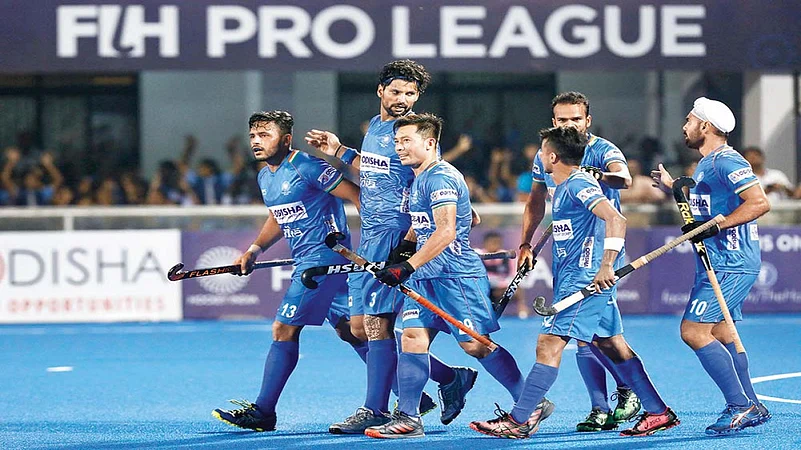Well, it’s not long until the 2020, or should I say the 2021 Tokyo Olympics. It has been a long time coming; we are all looking on with so much hope and anticipation and I am sure it would go well. It only feels like such a short time ago that I was in India coaching and hoping that the country that has given me so much from hockey wins success.
Unfortunately, to develop a successful team takes time. As we all know, India wants great results instantly, or else a blame game starts. India in the past has had so much success with its record Olympic gold medals that I am sure it led to the belief that if you just turn up you will win. Unfortunately for India, other hockey nations had different ideas.
Complacency, politics, lack of sports science, self-interest groups and poor coaching effectively ruined any chance India had of returning to its old glory days. However, with the establishment of Hockey India under Dr Narinder Batra, it gave them a secure base and a vision for the future.
The first programme was the Indian Hockey League, where foreign players and those with international experience played with local players. It had a hand in the development of Indian players and gave them the belief that they were just as good as foreign players. And they were. The successful Junior Under-21 World Cup team was where Indian hockey started getting rebuilt. This gave India, as I had predicted, the basis for the 2020 Olympic team.
Of course, let’s not forget Harendra Singh. This is the group of players that he helped develop into Junior World Cup champions and form the basis of this Tokyo Olympic team. This young group, with 10 debutants, will hopefully bring back success and justify their pride in Indian hockey.
India have played some very tough games against the best in the world over the last few years and have shown that they are a force to reckon with. They have shown mental toughness in games when they were behind and an ability to win games with flair when they were in front. The Olympics will be the truest test of what type of team they are. Will they measure up to the pressure?
I believe India are the dark horses of this Olympics and have more to prove and show to the world of hockey. With Manpreet Singh and Sreejesh knowing how difficult it is to win one game at an Olympics, leave aside win most games and finish with gold, they will leave nothing to chance and will inspire younger players to be at their best.
I am not forgetting about the women’s team, which has been steadily improving under coach Sjoerd Marijne. However, although they will do well, I don’t believe they are a medal hopeful. I hope they prove me wrong but the top six women’s teams in the world are still very strong and with India ranked ninth it may prove too big a challenge. The Netherlands women will win gold; the rest will be chasing the other places.
This Olympics will be a real test of the strengths of hockey programmes around the world. There are realistically seven men’s teams that have a chance to win gold: Australia, the Netherlands, Belgium, Germany, India and Argentina.
Let’s have a look at some of the teams that I believe have a medal chance. Belgium, the current World Cup holders, will be strong contenders. They will be the oldest team in the competition and will be playing in an extremely hot and humid climate. As the Olympic teams are only allowed 15 field players and one goalkeeper for two games in a row, with a day’s rest for the whole tournament, it will be extremely tough for an older team to recover enough to perform at the highest level.
The pressure will be on the Netherlands to perform as they have a very well-rounded team with a lot of experience. But they, too, will find the conditions tough. The Dutch have had a few mixed results in the last couple of years but looking at the recent FIH Pro League games, it looks like they are coming into some good form.
Germany are just Germany and always prepare well for each Olympic cycle. You never see the best German team until you see them at an Olympic Games. They have always built their teams with a view of achieving Olympic gold. They have a young team, balanced with some very experienced players in Fuchs, Hana and young superstar Ruhr.
Being ranked No. 1 in the world currently, Australia will always be in with a chance of a medal, and are a physically strong side with a good blend of experience and youth. The lack of international competition may prove to be a major problem in their quest for Olympic gold.
Great Britain are always a tough team but I don’t think they have the depth to achieve an Olympic gold. They always have the ability to produce some surprise results and give teams a hard time. New Zealand, also gritty, could produce upsets if opposition teams take them too lightly.
Argentina have played some FIH Pro League games and looked to struggle against India in recent games but they always manage to bring their A game at the Olympics and will be a tough team to beat. I don’t think they have the goods to win gold, but are always a dangerous team.
So, let the Games begin!
(This appeared in the print edition as "Arise, Dark Knights")
(Views are personal)
Michael Nobbs, a former Australian international, was India’s coach at the 2012 London Olympics
















